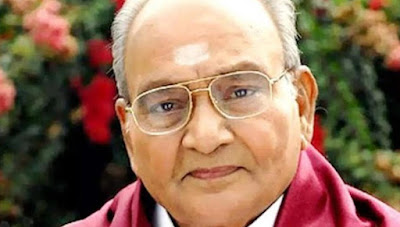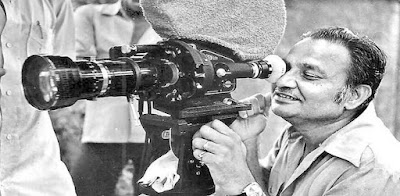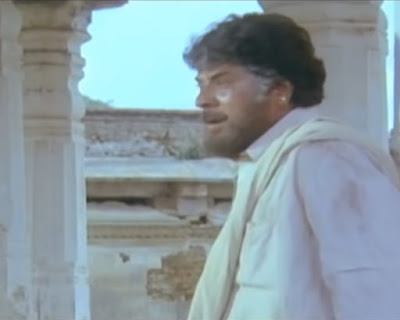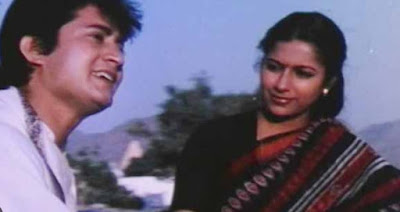 |
|
Picture Courtesy: India Today 19.02.1030 – 03. 02.2023 |
This past week, I have had occasion to ponder upon what Kamal Hassan referred to as ‘the transience of life and the immortality of art’. We have lost two luminaries – Producer-Director K Vishawanath, a colossus who reigned over the Telugu film industry for nearly six decades; and singer Vani Jairam, who had a successful career in disparate languages. I will pay my tributes to the latter at a later stage, but now, I want to express my appreciation to a film-maker whose films filled my childhood with the colours of love, humanity, kindness and compassion.
I first ‘met’ K Vishwanath through his film ‘Sankarabharanam’ which created waves when it released in Kerala. Then, a couple of years later, ‘Sagara Sangamam’s’ Tamil version titled ‘Salangai Oli’ released in my home town to thunderous applause. By now, I was looking forward to watching a film, any film directed by Vishwanath. It didn’t matter who the stars were; his name was enough to draw me to the theatre because his films, rooted in tradition, were yet so progressive in their outlook. The multi-faceted auteur breathed his last on 3 February 2023. A belated but heartfelt tribute to the master.
Kasinadhuni Vishwanath, born on 19 February 1930, began his career as a sound recordist at Vahuni Studios, (then-) Madras. Apprenticed to veteran sound recordist, A Krishnan, Vishwanath became a sounding board for his mentor when the former switched to direction. Soon, he would make the shift himself, becoming an associate to industry veterans like Adurthi Subba Rao and K Ramnoth. In an interview in the 2000, he talks about how Adurthi never restricted him to his role as audiographer but involved him in story sessions, script-writing and even direction. Vishwanath’s first stint as AD was for Mooga Manasulu (1951). Parallelly, he was also scripting and writing screenplays for films.
 |
| Picture credit: ANS |
In 1965, he ventured to direct his first film Aatma Gowravam. This had a conventional plot and situations, but the film received plaudits for being a realistically enacted commercial entertainer. A slew of 'social dramas' – some successful, some not – followed. With Kalam Marindi (1972), came the first glimmering of Vishwanath’s social consciousness – the film dealt with characters and their lives in a caste-based society. While physically or mentally challenged characters had made their appearance in Vishawanath’s films prior to this, and were treated sensitively, it was not until 1976 that he would write a full-fledged story featuring such a character as the protagonist – Siri Siri Muvva starred Jaya Prada in only her second role as lead (her first was K Balachander’s Anthuleni Katha that same year). With its focus on dance and music, Siri Siri Muvva was a colossal success.
But it was Sankarabharanam (1980) that would make Vishwanath a household name in other states, especially in the South. With its focus on Carnatic classical music, the film travelled beyond borders, appealing to swathes of people across disparate strata of society. It also contributed to an increased interest in classical music. In 1995, bowing to his hero, Kamal Hassan’s persuasion, Vishwanath donned the mantle of actor in his own film, Subha Sankalpam. This was followed by several roles in Telugu, Tamil and Kannada.
K Vishwanath’s much-decorated filmography brought classical music and dance into mainstream films, and by interweaving them with human stories, made both accessible to the lay public. He was fascinated by the human psyche and many of his films delve into its complexities, sometimes very seriously. Social issues popped up in his movies just as often as classical music and dance – untouchability, casteism, colourism, misogyny, dowry, alcoholism, the dignity of labour, the challenges for Indian classical art forms, etc., were all themes that he touched upon in film after film. And he did this without resorting to heavy-handed preaching or focusing on the ‘message’ to the detriment of the film. He was gifted at leavening the message with a soupcon of humour so as to appeal to the larger demographic.
Considered one of the finest film-makers in Telugu,
Vishwanath’s films brought an old-fashioned word, ‘grace’, into Telugu films. His
stories featured ‘real’ people in relatable situations. They spoke like us;
their issues were ours. His films also called for greater inclusivity of the
differently-abled, and treated them with great sensitivity and compassion. Characters
with physical or mental challenges in his films were not there to be made fun
of; very often, they played the protagonists piloting their own narratives in a
‘regular’ world. What’s more, within the boundaries of the society they lived
in, and the period in which they lived, his women held the reins
of their own narratives, and were strong in a way that most female characters
weren’t allowed to be in the cinema of the time. Their stories are strongly traditional, however, and it is within those parameters that you must view the characters. In that, he was perhaps still a product of his times.
 |
| Picture courtesy: Kamal Hassan@Twitter |
The Padmashri and Dadasaheb Phalke Award winner was known to be a hard taskmaster, but his actors have only every had the nicest things to say about him. Chiranjeevi considers him a father figure. Jaya Prada, who did some of her finest work with Vishwanath, considers him her mentor, her guru. “Everything I know about acting, I learnt from him,” she said, in her tribute to the legend. For Kamal Hassan too, he was both mentor and guru. In fact, two of the veteran actor’s greatest films – Sagara Sangamam and Swati Muthyam – were directed by K Vishwanath. While Vishwanath’s films often featured ‘stars’, they weren’t dependent on them. In fact, stars often shed the baggage of their stardom in his films.
A subjective look at some of my favourite K Vishwanath films…
Sankarabharanam (1980)
Watch Manju Bhargavi dance to Raagam taanam pallavi.
The film won four National awards, seven Nandi awards (Andhra Pradesh’s State Awards), the public choice award at France’s Besançon Film Festival. Sankarabharanam was remade as Sur Sangam in Hindi with Girish Karnad and Jaya Prada stepping into Somayajulu's and Manju Bhargavi’s roles.
Sagara Sangamam (1983)
Watch two talented trained dancers in Naadha vinodham. Or watch this clip, where Kamal ends an argument by providing a master class in dance.
Saptapadi (1981)
Saptapadi was remade as Jaag Utha Insaan starring Sridevi, Mithun Chakraborty and Rakesh Roshan, three years later.
Watch Sabitha Bhamidipati's wonderful tandav sequence here.
Swathi Kiranam (1992)
Vani Jairam won the National Award for Best Playback Singer (Female) for this song.
Swathi Muthyam (1986)
Here is Suvvu suvvi suvvalamma from the film.
Swarabhishekam (2004)
Swarabhishekham is the story of two classical musicians whose professional and personal relationship deteriorates as the limelight shines brighter on one sibling. It takes time before they realize that their compositions are good only when they collaborate with each other. Vishwanath dons the greasepaint to essay the role of Srinivasachari Srirangam, while Srikanth plays his yonger brother, Ranga. With music by Vidyasagar, the film was a nostalgic reminder of gentler times in Telugu movies, and garnered two National awards.
Neramu Sikhsa (1973)
A story inspired by Fyodor Dostoyevsky’s Crime and Punishment, Neramu Sikhsa follows the journey of Vijay (Krishna), the scion of a rich family. When a tragic occurrence changes the course of his life, Vijay learns what it takes to make sincere amends to help those affected by his actions. Vishwanath took the basic concept of Dostoyevsky’s seminal work to craft a thoroughly Indian version.
Swarnakamalam (1988)
This was an interesting film – it allows its
protagonists, two classically-trained dancers, to question the different paths that
life takes them on. While one sibling is grateful for her training and looks
forward to honing her skills in an art form she loves, the younger sibling (Bhanupriya
as Meenakshi) desires an easier life. Given that the performing arts weren’t
(aren’t?) sponsored well enough for any but the top echelons of performers to
earn a living from performing, her fears are well-founded. The film treats them
with respect and the narrative traverses her arc from disinterest to eventually
becoming devoted to dance. [Now, if only the director had allowed that choice to stand!] One of the highlights of this film was a philosophical
debate on the nature of art and performance as Meenakshi performs a variety of
classical and folk dances. While the
other was a dance performance by noted Odissi exponent Sharon Lowen. Watch it for the excellent performances and dances - Bhanupriya is a joy to watch.
Sirivennala (1986)
Sirivennala is an underrated
gem of a movie from the master director. A love triangle involving a blind flautist,
a mute painter and an escort who becomes a sponsor for the former, the film stood out for both the restrained
story telling as well as the restrained acting. Never has a sex worker been so
respectfully treated in Telugu cinema. And no, she’s not the virginal whore or
the whore-with-the-golden-heart character that is so beloved of films across
languages. She just is. But I do wish her character arc didn't end the way it did. [Remember what I said about the director being a product of his times?]
Subha Sankalpam (1995)
The sea is a recurring motif in Vishwanath’s films. Here, it transforms into the living, breathing heart of its fisherman protagonist, played by Kamal Hassan. The story of a benevolent businessman and a young fisherman who loses his family while he’s away at sea, Subha Sankalpam is the weakest of the three films that these master entertainers did together; it lacks the masterly touch of Vishwanath’s earlier collaborations with Kamal, but this film still managed to tug at your heart.











No comments:
Post a Comment